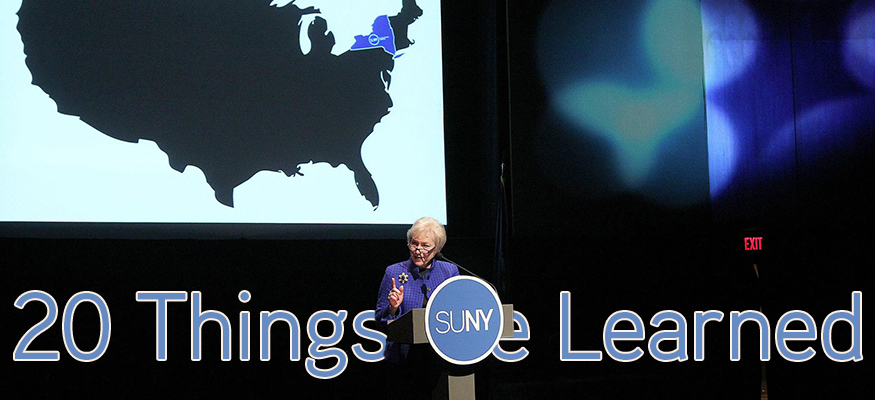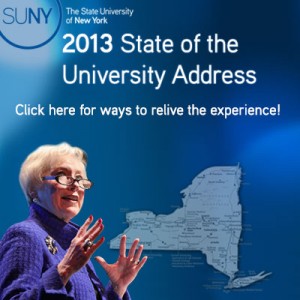 Chancellor Zimpher’s State of the University Address was on Tuesday, January 15. As the SUNY Board of Trustees, college presidents, and others packed The Egg in Albany, Chancellor Zimpher outlined progress made in the past three years and a bold new plan going forward.
Chancellor Zimpher’s State of the University Address was on Tuesday, January 15. As the SUNY Board of Trustees, college presidents, and others packed The Egg in Albany, Chancellor Zimpher outlined progress made in the past three years and a bold new plan going forward.
1. College is worth it. Chancellor Zimpher cited Vivek Wadha in saying, “Students, you are probably not Mark Zuckerberg, so stay in school.” Chancellor Zimpher took the question of college’s purpose head-on:
…While you may have the next game-changing idea in your field, without the educational foundation to bring your idea to life, you are no better off. Without the business knowledge to start a company, without the research experience to bring your hypothesis to life, or the writing skills to express your ideas, you are no better off than if you had no idea at all.
While Jobs, Gates, and Zuckerberg are the poster children for success without a college degree, consider the number of Fortune 500 CEOs who did complete college.
2. SUNY will create an 11th grade college readiness exam to help students determine if they are on track for college. In an effort to curb costly remediation, the exam will be piloted this fall in SUNY’s Smart Scholars Early College High Schools. The Chancellor referred to the exam as one “high school students would actually want to take”.
 3. 98% of the 5,000 students served by the Early College in High School Program are on track to graduate. SUNY currently has 23 schools using the Program, which have been leaders in preparing traditionally under-represented and under-prepared first generation, low-income students for rigorous instruction in high school and college.
3. 98% of the 5,000 students served by the Early College in High School Program are on track to graduate. SUNY currently has 23 schools using the Program, which have been leaders in preparing traditionally under-represented and under-prepared first generation, low-income students for rigorous instruction in high school and college.
4. By 2014, 10 regional STEM hubs will be in operation throughout the state. Five were created in 2012 and the other five will be completed this year. These hubs raise awareness about the demand for STEM graduates and with business and industry partners, help SUNY design curriculum and provide placement for students in internships and graduates in jobs.
5. S-TEN, the SUNY Teacher Education Network, will help pilot three Centers of Pedagogy this fall. SUNY trains 5,000 teachers every year—the majority of whom stay in New York State—and establishing a richer network will enhance the quality and quantity of those teachers by instituting clinical study, similar to that of doctors and nurses. S-TEN was announced in November.
6. The average time it takes a SUNY student to earn their four-year degree is 4.4 years. This is the fourth-best in the nation, after only much smaller states.
7. SUNY is officially launching Open SUNY in 2014. Ten Open SUNY degree offerings will be available at launch, with three being piloted this fall.
8. Open SUNY will enroll 100,000 students in its first three years. That’s the largest online enrollment of any public system. Quality is maintained by utilizing SUNY’s best faculty, like those in the newly-created SUNY Distinguished Academy, whose members will begin uploading their best lectures in a massive open online course format.
9. Students will be able to have the choice to graduate in three years by using SUNY Smart Track. In fact, by 2015, 25% of SUNY students will have this option.
10. SUNY is establishing SUNY Complete, paralleling a nationwide effort toward completion. Chancellor Zimpher touts it as a “win-win” program that will help students who left a two-year program with 60 or more credits return and complete the remaining credits toward their associate’s degree.
11. General education credits are 100% transferable between all SUNY schools—two years ahead of schedule.
12. SUNY REAL will allow students who have work experience translate that to college credit. This, which includes military experience, will dramatically diminish the need for the repeat courses or costly skills training students already have. It will be operating on every campus by the end of the year.
13. Shared Services has saved $20 million in its first year of operation. The dollars saved are reinvested in academic services. Chancellor Zimpher explains how SUNY is on track to save the System $100 million by 2017:
In the coming year, Plattsburgh and Clinton will explore a shared food service contract; Delhi and Cobleskill will centralize employee recruitment and background checks; campuses across the state will examine how they can share printing services; and Cortland, Delhi, TC3, and UB have partnered to form the STAR-NY Consortium to provide online tutoring to their students.
14. SUNY’s student loan default rate will decrease by at least 5% over the next five years. The decrease will be a result of SUNY Smart Track, by both decreasing time to completion and increasing awareness of financial commitment.
15. Experiential education will be recorded on an extracurricular transcript and designated on the students’ diploma. The new SUNY Plus diploma designation will record SUNY Works, SUNY Serves, and SUNY Discovers opportunities students engage in – ensuring that a student’s experiences count.
16. By 2015, SUNY Innovation Hubs will be developed for cities across New York. The Hubs combine next generation research, academic and workforce training, and the major needs of the community in partnership with the state’s REDC‘s. They provide experiential education opportunities for SUNY students and connect all of the relevant research and development entities in these communities toward a common vision.
17. One in three physicians practicing in Brooklyn, and one in nine in New York City, was trained at Downstate Medical University.
18. This year, SUNY will pilot an Entrepreneur-in-Residence program at each of our Regional Tech Transfer Hubs. The programs help identify the milestones necessary to move a discovery-based idea to market. Moreover, this program will ensure that these start-ups are well positioned to attract outside capital and managerial talent that will allow it to thrive locally.
19. Although already thousands below the national average, SUNY will work to lower the average indebtedness of its students. Chancellor Zimpher touts the SUNY Smart Track Program in making that possible:
…We have created the SUNY Smart Track program to adopt the federal Financial Aid Shopping Sheet, expand our Student Loan Service Center, engage early with high risk students as defined by the U.S. Department of Education, and provide online resources such as a net price calculator, chats with financial aid experts, and financial literacy materials.
20. Every SUNY campus will implement a common data system by 2014. This means a uniform platform to gather all kinds of data, from student enrollment to learning outcomes. By doing this, SUNY will build the biggest, baddest, Excel spreadsheet of all time.
Chancellor Zimpher explains:
… Our point here isn’t just to be the biggest—the point of creating this system is to make data-driven decisions around all the important factors that lead to student success. Mobility, time to degree, success metrics. You’ve surely heard of cities and governments doing this, and we want to do the same—analyze data to make better decisions, proactively resolve problems before they occur, and coordinate resources to operate as efficiently as possible. SUNY will truly create the smarter university.

